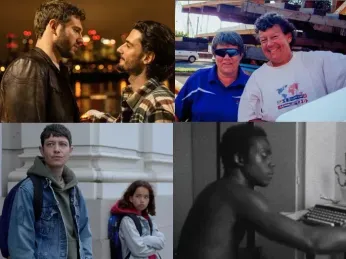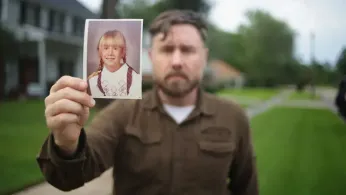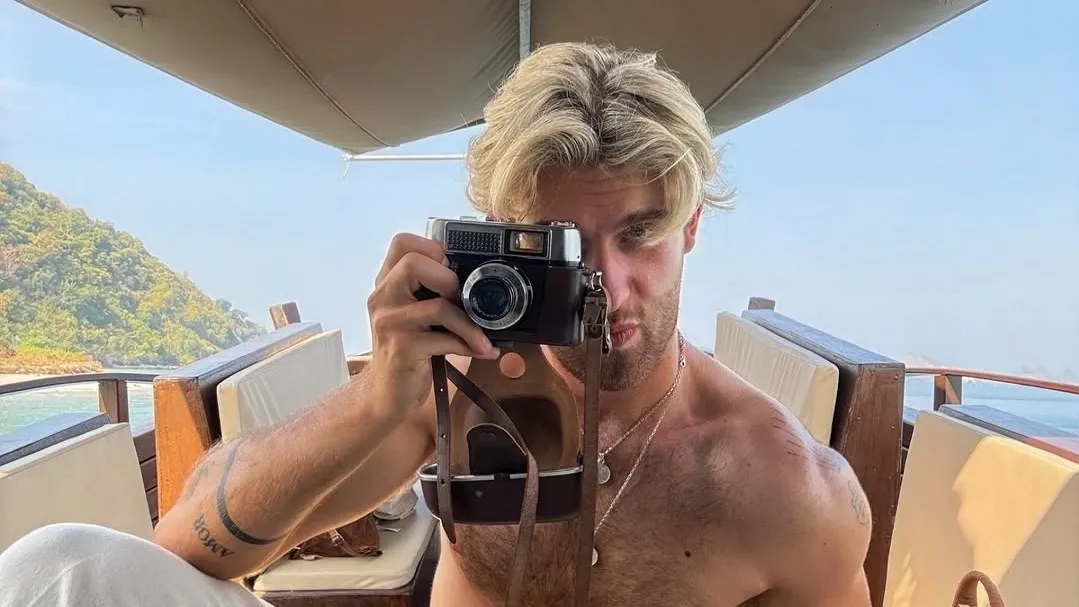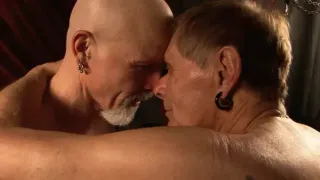
Jun 17
Frameline49’s far-out, fun and fearless films, part 2
Brian Bromberger READ TIME: 2 MIN.
In her comments before the press, Frameline’s Executive Director Allegra Madison expressed the political climate faced by arts communities today.
“We are living in a time when bigotry, discrimination, and ignorance are being disguised as policy and law,” she said. “Our queer community faces systemic oppression that is wide-ranging and relentless. On the best day, we suffer the embarrassment of being citizens by a country led by evil clowns.
“I’m tired of having queer beauty denied. I’m tired of having to defend our right to exist. It is exhausting calling out the blatant censorship of our queer art and culture that is designated as changing priorities. I’m tired of explaining to our allies that this is an attempt to control our history and erase our lived experience. It is a pointed existential attack on organizations, like Frameline, which has a target on its back.”
However, Madison isn’t surrendering by any means.
“I’m a Black queer woman who stands on the shoulders of generations of Black women, queer artists, and activists who came before me, who taught me to love and value myself and others at all costs. People who pushed the civil rights movement forward, people who got us through McCarthyism and the Lavender Scare, people who created support networks that got us through the AIDS crisis when our government abandoned us and left us to die. Those generations are with us now, reminding us that we don’t have time to despair. This is the legacy of our queer history and our queer films we are celebrating in Frameline49.”
Lonely people at the end of their rope trying to find a reason to trek on anchors the British drama, “A Night Like This.” Lukas, a struggling actor, who has achieved nothing, is ready to commit suicide when he meets Oliver, a nightclub owner going bankrupt. They decide to spend the night together exploring London, seeking the meaning of life. Oliver is inspired to pursue his childhood dream of singing country music, while Lukas gains some hope through their newfound connection.
But in addition to Lukas’s depression, Oliver sells drugs to minors so as to keep his business alive. Can their lives accommodate love? This is a talky movie, with several long speeches/soliloquys, similar in theme to the far superior Andrew Haigh movie “Weekend” about a one-night stand trying to be something more. Only here there’s no sex, just kissing. The plot has too many convenient accidentally running into someone scenes. Oliver at one point says to Lukas, “in order to really get to know someone, you must spend 200 hours with them.”
Some-times the film seems like 200 hours. Still, it’s redeemed by the charming chemistry between the two leads that gives it a warm, intimate hue. The theme of people trying to find their place in an isolating, ever-changing world does resonate. The scene of Oliver singing in a club is the highlight of the film, as is the line, “We’re flickering lights in someone else’s darkness.”
A fun romp in Reykjavik inhabits the Icelandic comedy “Skinny Love.” Bisexual content creator Emily has lots of subscribers as she stars in her own porn videos, with her approving mother doing her finances. She also works part-time as a record store clerk. She’s not possessive and does whatever makes her happy, even if it sometimes makes others unhappy.
She has an open long-term relationship with Katinka, a geochemist, who lives in Poland. They have sex in the forest and cavort in the hot tub, but no real commitment. Katinka arranges for her job to be transferred to Iceland, seeking a more exclusive relationship with Emily, though she’s okay if Emily needs to have sex as part of her work.
This creates a crisis for Emily, who isn’t sure she wants to take the relationship to the next level. Katinka’s character isn’t well developed, yet you feel sorry for her because Emily is so self-centered. The film slyly asks questions about intimacy and establishing boundaries, but nothing deep here. It has a droll, Gen Z fluidity ambiance, complete with that Scandinavian nonchalance about sex.
“Outerlands,” was filmed in the non-touristy Outer Richmond area in San Francisco. Nonbinary Cass (Asia Kate Dillon) is barely surviving paycheck to paycheck in SF’s increasing gentrification environment, as a waiter at a high-end restaurant, a nanny, and part-time party drug dealer. Cass drinks themself to sleep.
Cass has a one-night hookup with Kalli (Louisa Krauss), a new waitress at the restaurant. She has a potential job in Reno and asks Cass if they will watch her 12-year-old daughter Ari (Ridley Asha Bateman). But after a few days, there’s no contact with Kalli, so Cass must take care of Ari. They are both lonely, hurt people, but they bond over a video game. Ari’s abandonment by her mother provokes anger but also sparks memories of Cass’s mother’s abuse of them.
The best scenes are Cass and Ari being vulnerable with each other as they learn to care for each other. There’s also an implicit critique of San Francisco as no longer the friendly safe harbor for outcasts it once was. Compelling character study, though the screenplay could’ve been improved with more background material on Cass, who’s hard to connect with in the film’s first half. There’s a lovely supporting turn from lesbian former SF comic/actress Lea DeLaria as a friendly, solicitous bank officer. Empathetic, at-times compelling tale on the healing power of kindness, belonging, loss, and chosen family with outstanding performances from Dillon and Bateman.
It’s cheeky gender-bending twists a la Shakespeare’s “Twelfth Night,” done teen-age style in the comedy, “She’s the He.” During the final week of high school, Ethan and Alex pretend to be trans women so as to stop the rumors that they are gay and dating, but also to get Alex closer to his crush Sasha.
But after putting on a dress, Ethan realizes she really is trans much to the consternation of his mother. He comes out to Alex at Sasha’s slumber party. Alex, in desperation, accidentally admits their lie to Sasha. The girls turn against both Ethan and Alex, where all hell breaks out. Will their catty gay friend Davis help them turn everything around or make it worse?
The cast is mostly trans, including casting trans men as the cis male characters. It’s written and directed by a trans filmmaker, who is attempting to reclaim the teen rom com for trans folk as well as being a throwback to late 90s adolescent comedies. The film pokes fun at transphobic conservative bombast, especially the fear-mongering around trans bathroom access. The film doesn’t want you to think too deeply, as there are plot holes the size of pot holes in the plot, not to mention idiotic sequences.
Even with Gen Z fluidity, that other students would immediately believe and accept two men are suddenly trans strains all credulity. The best, even poignant scenes are Ethan’s slow realization of who she is. It’s this year’s “Bottoms,” but not as good or funny. Aided by frenetic pacing and animation gimmickry, its joyous, carefree attitude is infectious and considering all the vitriolic attacks on trans people these days, we can use some laughs to quell the continuing, ever rising rage we feel.
If I told you that a film that shows mostly a doctor’s appointments with his patients, you would think this will be boring, but to the credit of director Gianluca Matarrese and especially the protagonist, you would be wrong, in the riveting Italian documentary, Gen_.
At Milan’s Niguarda free public hospital, Dr. Maurizio Bini sees two types of patients: aspiring parents/infertile couples undergoing IVF and transgender people seeking gender affirming therapies, especially puberty blockers. Italy now has a conservative government placing more legal restrictions on both these treatments, even a proposed law to make surrogacy a punishable crime.
Dr. Bini, at the twilight of his career, is trying not only to mediate between clinical judgment and stringent legal restrictions, but also give compassionate care gaining the trust of very vulnerable, hurting patients, not just healing the body, but affirming the dignity and worth of every individual who comes into his office.
At a time when public healthcare is under attack in this country, it is a balm to see a system that “prioritizes humanity over profit and resilience over resignation.” It’s a stirring meditation on what public healthcare aspires to be. Bini is a hero and deserves awards, not criticism. The outside clinic scenes where Dr. Bini indulges his passion for collecting exotic mushrooms, are welcome asides. This documentary is the reason why we attend and love film festivals. A shocking surprise and one of the peak moments of Frameline49.
For those during Pride searching for more gay heroes, look no farther than Angela Madsen, profiled in the winning documentary, “Row of Life.” Madsen was serving in the Marine Corps when a botched back surgery left her paralyzed, discharged, and then homeless. She rises from the gutter, to become a three-time Paralympian and fourteen-time Guiness World Record holder, as a champion ocean rower.
Yet the film is less about Madsen’s remarkable back story, than on her April 2020 final ocean crossing, with the love and support of her life partner Deb. She sets off solo and unassisted in her 20” ocean rowing boat, Row of Life, to cross 2500 miles of open ocean from LA to Hawaii. If successful, Angela at 60, would’ve been the oldest woman, first openly queer athlete, and only paraplegic to accomplish such a goal. This was her most ambitious row and she planned to retire once finished.
If you read the news, you know Angela didn’t finish. While the first half centers on Angela, the second part focuses on Deb, of life after loss and securing Angela’s legacy. Angela’s warm personality, her unrelenting belief in herself, the boldness of her visionary goal, sense of humor, and stubborn eccentricity, wins over audiences. And director Soraya Sim, facing every filmmaker’s nightmare of a disaster ruining her movie, instead transforms it into an absolute triumph of indomitable spirit, both Angela’s and Deb’s. Kudos all around and another Frameline49 highlight.
We are treated to an impressionistic but lyrical anachronistic depiction of the Black gay writer James Baldwin in a virtually silent film, “Jimmy.” Shooting in evocative black-and-white on stock 16mm film, photographer and filmmaker Yashaddai Owens covers the period beginning in November 1948 when 24-year-old Baldwin (played by Benny O. Arthur) with a fellowship grant, left New York and relocated to Paris, settling in the city’s Algerian quarters and the Left Bank artists in Saint-Germain-des-Pres, where he wrote his early novels.
There is virtually no use made of Baldwin’s works, except a brief excerpt from “No Name in the Street” at the end, where Baldwin exclaims, “I’m a free citizen in a free country.” Baldwin wanted to escape the pervasive racism of America. So there are ‘scenes’ of Baldwin reading, writing, and falling in love amidst the bustling rhythms of Paris, as he discovers a new identity, independence, and erotic liberation.
I was initially disappointed with this film as I was hoping to learn more about Baldwin’s life, but as it’s only an hour long, I rewatched it and appreciated the freewheeling exhilaration Baldwin must have experienced. “Jimmy” seduces you, aided by a lush original score by Paso Andreo. Obviously, if you are seeking a biography of Baldwin, this is not the film to watch, but I can now appreciate how Baldwin as an artist was able to reengage with the world, which catapulted his creativity.
Timed to coincide with the reprinting of SF queer outlaw author Michelle Tea’s 2000 lesbian cult classic “Valencia,” the 2013 movie “(Return to) Valencia” is being screened. Fleeing Tucson and her rotten (ex-)girlfriend, Tea lands in the rebellious punk hipster lesbian Riot Grrls diaspora scene of pre-dot-com-startups early 1990s San Francisco in the Mission District and its focal point, Valencia Street, now gentrified beyond recognition.
Tea gave 20 different directors chapters from her book to dramatize in a style of their own choosing and they in turn cast 18 different ‘Michelles,’ all of whom cross racial, geographic, gender, and size categories, giving new impetus to intersectional filmmaking. There’s no real narrative here, though Michelle’s at times hellish relationship with her on-and-off again butch girlfriend Iris is the main thread, complete with hookups, breakups, and makeups.
But the film’s star is the city’s riotous underbelly with its poetry open mics, extreme self-inventions, clubbing, binge drinking at dive bars, zine-making, body-positive femme-filled sexuality even fisting and a brief stint as a sex worker in a Marin bordello, communal crash pads, fringe galleries, and drugging, including a Claymation magic-mushroom trip sequence in a SF that no longer exists.
Also unforgettable are turquoise-hair Tea’s trip to the Midwest for Iris’ Christian sister’s wedding, time spent with manic Space, who believes he was abducted by aliens, and a mutual SM relationship with the knife-play enthusiast Cecilia, who later disappoints Tea by becoming sober. There’s even archival footage of the 1995 Dyke March. This bracing, but too-long to the point of exhausting artsy film is undefinable, which is why it’s so revered.
By no means for all tastes, it’s a frenetic trip down memory lane complete with a vintage queercore and alt-rock soundtrack (i.e. Tribe 8, Pansy Division) that will mean most to the dykes that lived through that era. The essence of the film is in Tea’s description: “We were not gay. We were queer. We were dykes. We were really against the man and capitalism and always aware of everything that was unfair and unjust.”
Prepare to be unsettled by Jun Li’s “Queerpanorama,” from Hong Kong, which follows an unnamed 23-year-old gay man (Jayden Cheung, in an impressive debut) as he goes from hook-up to hook-up using a dating app, but impersonates the identity of the last man he met with the next guy he meets.
He introduces himself by their name and describes their occupation as his own. He first says he’s an actor, then a scientist, a teacher, a delivery guy, an architect. In almost every encounter he mentions he’s in a long-distance open relationship, which seems to be the one constant, as only by pretending to be someone else can he actually be himself.
At times, he’s horny, looking just for sex and other occasions he’s seeking an emotional connection, asking their stances on life, love, and sex or what issues they are facing at work. With kindness and respect, some meetings have an almost spiritual quality to them. The audience will ask who is this person, as he never actually gives himself away, yet he’s probably asking the same question.
Ultimately, as strange as this setup is, it works, keeping your attention because he’s wrestling with his purpose in life and the meaning of being human. The conversations can be playful or profound. Some of the encounters can turn ugly and violent. One is struck how uninhibited all the characters are, finding pleasure in each other in all its forms, so yes, the sex scenes are explicit, steamy, and hot. The audience feels like they are voyeurs but we can’t help not looking. The whole cast are non-professionals. The black-and-white cinematography is exquisite, as each shot has a vibrancy and aliveness that contributes to the intimacy of every scene.

Another film that will produce rage, if you’ve ever wondered about the I in LGBTQIA, the medical expose documentary, “The Secret of Me,” will enlighten you. We learn about Kristi, a teenage girl playing soccer in a conservative religious Baton Rouge, Louisiana.
In college, 1995, in a feminist studies class, she reads a textbook that describes what she’s been experiencing all her life, that there was something off about her identity, as well as the devastating realization that she’s been lied to her whole life by her parents and doctors. Then the camera pans to Jim Ambrose, in his 40s, who speaks into the camera, “I am Kristi, but this is not a trans story,” though he has the utmost respect for them. It’s an Intersex story.
After obtaining his birth records, he uncovers he was born with XY male chromosomes but because his genitals were judged small and atypical, the urologist, Dr. Robert Carter, with the consent of his parents, surgically removed his testicles and his penis. Jim was raised as a girl and was never told what happened to him. This chain of events is based on the work done by Johns Hopkins psychologist John Money, who advised the parents of a male victim after a botched circumcision, to raise him as a girl.
That child, David Reimer, was troubled at an early age as Brenda, who later committed suicide as an adult in 2004. Money’s case was a failure, not a success story, but refusing to admit the truth, it became the standard intersex treatment. Journalist Bo Laurent broke the story revealing Money’s deceptions in “Rolling Stone,” but it made little impact, with this scarring surgery and hormonal therapy continuing today. Ambrose got involved with trailblazing intersex activist Tiger Devore and founder of the Intersex Society of North America.
His fury can be unsettling, especially as he confronts his parents. The message is how people who deviate from strict gender norms are demonized by others, which can be harmful. The film, produced by the same innovative team who gave us “Three Identical Strangers,” another nature/nurture conflict about triplets separated at birth, is a call-to-action to stop the mutilation of intersex babies.
Tacky recreated scenes, jarring dramatic music, and a staged confrontation with Dr. Carter that’s slightly anti-climactic, prevent us from calling the film great, but it is likely to be groundbreaking by discussing a formerly taboo subject. Even with its minor flaws, this gripping documentary, that feels like a detective story, is one of the apexes of Frameline49.
Read more film reviews in last week and next week’s issues.


